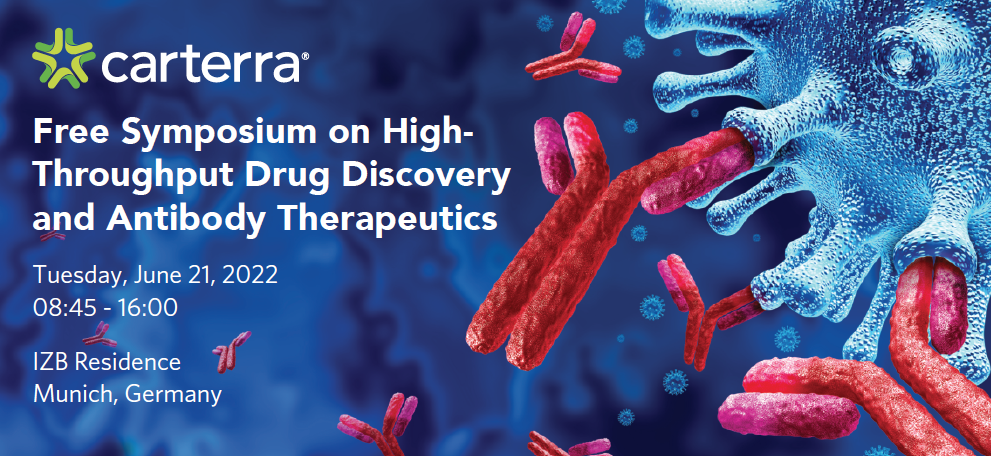
What You Will Learn
Please join Carterra at our upcoming symposium in Munich, Germany. You will spend the day learning about high-throughput drug discovery and antibody therapeutics with some of the industry’s leading scientists. Our speakers will present new ways of looking at discovery, applications, and workflows, including HT-SPR. The topics you'll hear about include:
- Antibody discovery in 90 days! Screening, identification & characterization
- New methods in DELs, PROTACs and other formats
- New technology and innovations during the pandemic
- Data analysis routines & automation
- Best practices in analyzing SPR data
Network with your peers. Lunch will be provided. Registration is required as seating is limited.
Register Here
Agenda
|
08:45 – 09:00 |
Arrive and Check-in |
|
09:00 – 09:30 |
Networking and Coffee/Tea |
|
09:30 – 09:45 |
Symposium Begins—Welcome |
|
09:45 – 10:30 |
|
| Abstract: The Coronavirus Immunotherapeutic Consortium (CoVIC) was formed to develop prevention and therapeutic strategies against SARS-CoV-2 that could be mobilized in low- and middle-income countries. With now almost 400 unique antibodies, CoVIC has mapped the epitope landscape on the SARS-CoV-2 Spike protein using the Carterra LSA platform. This information, coupled with high throughput viral neutralization screens and in vivo protection studies, has revealed key communities of receptor-binding domain (RBD)-targeted antibodies that are resistant to major emerging variants. These results provide a framework for selecting antibody treatment cocktails and understanding how viral variants might affect antibody therapeutic efficacy. | |
|
10:30 – 11:00 |
Randi Westh Hansen, PhD, Senior Scientist, Antibody Technology, Symphogen a Servier Company |
| Abstract: Using high-throughput Surface Plasmon Resonance (HTP SPR) it is possible to measure hundreds of binding interactions in parallel in a real-time and label-free manner. Binding kinetics, affinities, and cross-reactivity to orthologs or protein family members of large antibody panels combined with epitope binning enable rapid characterization of hundreds of antibody-antigen interactions and epitope coverage. In my presentation, I will show examples of how we use HTP SPR in our workflow of characterizing therapeutic monoclonal antibodies and how HTP SPR combined with a mutagenesis approach was used to identify the epitopes of a two-mAb mixture binding CD40. | |
|
11:00 – 11:30 |
Jon Popplewell, PhD, Field Applications Scientist, Carterra |
| Abstract: From kinetics to epitope characterization, HT-SPR has become an indispensable technology for the characterization of biotherapeutics. This presentation will focus on recently developed assays that expand the versatility of HT-SPR in the biotherapeutic space as well as move into new areas drug discovery. Topics include potency-based assays in addition to approaches focused on characterization of small molecule formats including targeted protein degraders (TPDs) and DNA encoded libraries (DELs). | |
|
11:30 – 12:00 |
Break and Finger Foods |
|
12:00 – 12:30 |
Marina Roell, PhD, Principal Scientist, Alector |
| Abstract: Mer Tyrosine Kinase (MerTK) has been implicated in several diseases and is a potential target for therapeutic antibodies. Different diseases may benefit from either increasing or decreasing MerTK activity. We used Carterra's LSA and analysis software to evaluate the epitope diversity of a panel of anti-MerTK antibodies by traditional competitive binning and by comparing IgG binding to domain-swapped chimera of MerTK extracellular domain constructs. Differential modulation of biological activity appears to be mediated by antibodies specific to epitopes in different domains of MerTK. These results enabled identification of binding regions for the epitope bins and investigation of the correlation between domain binding and differential activities of anti-MerTK IgGs. | |
|
12:30 – 13:00 |
Judicaël Parisot, PhD, Senior Field Applications Scientist, Carterra |
| Abstract: We will describe practical guidelines for designing, executing and analyzing epitope binning assays using Carterra’s LSA and industry-leading Epitope™ software. We will provide tips and tricks for leveraging the power of our software to groom a data set, remove unnecessary complexity, and apply community analysis while retaining sufficient nuance to most accurately describe the epitope landscape. | |
|
13:00 – 13:30 |
Oliver Zaccheo, PhD, Senior Group Leader, SPR and Biophysical Assays, UCB |
| Abstract: Surface Plasmon Resonance (SPR) provides a key screen to identify and characterize high-affinity, species cross-reactive antibodies generated by UCB’s Core antibody discovery platform. We have performed a head-to-head comparison of the Biacore 4000 and Carterra LSA and shown that the LSA is well-suited to the challenge of generating high-quality, high-throughput antibody binding data from individual b-cells. We have now incorporated the LSA to our routine workflows to guide molecule selection based on kinetic binding data and epitope binning. | |
|
13:30 – 14:30 |
Lunch and Networking - Cantina |
|
14:30 – 15:00 |
Sarah Stuart, PhD, High Throughput Characterisation Team Leader, GSK |
|
|
Abstract: In recent years there have been many advances in technology that allow techniques previously limited to small numbers of molecules to be applied to large numbers of samples. Applying such techniques in parallel to the early stages of the antibody discovery process enables determination of high throughput kinetics and biophysical screening of hundreds of antibodies. This can facilitate rapid selection of high affinity antibodies with acceptable early stage developability characteristics. A deeper insight into the data can be achieved by applying enhanced analytics capabilities such as artificial intelligence and machine learning. Data can be used for rapid advancement of discovery of new medicines but also in the longer term to track molecular characteristics throughout the discovery process and to predict molecular properties. I will discuss implementation and application of some of the methods and data workflows including use of the Carterra LSA which enable characterisation of more molecules with less material and in less time, and give greater breadth of characterisation, to accelerate decision making while improving opportunities for data reuse. |
|
15:00 – 16:00 |
Networking and 100th LSA Celebration |
|
16:00 |
Symposium Ends |
 Kate Hastie, PhD, Instructor, Ollmann Saphire Lab, La Jolla Institute for Immunology
Kate Hastie, PhD, Instructor, Ollmann Saphire Lab, La Jolla Institute for Immunology




